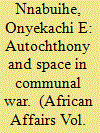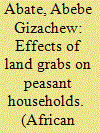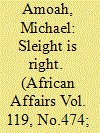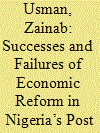|
|
|
Sort Order |
|
|
|
Items / Page
|
|
|
|
|
|
|
| Srl | Item |
| 1 |
ID:
175418


|
|
|
|
|
| Summary/Abstract |
Since the 1990s, there has been an upsurge in conflicts of autochthony in several parts of the world. Autochthony invokes a sense of a politics of belonging and an attachment to the land. In Nigeria, the phenomenon raises questions of citizenship and can reinforce exclusionary practices which in turn provoke widespread violence between different Nigerian populations. Infrastructure provision in a communal conflict environment is a critical element of autochthony struggle, which has yet to be fully explored. Relying on archival sources, focus group discussions, interviews and observation, this article interrogates how the interactions between autochthony and space stimulates communal conflicts and affect infrastructure provision in Jos, Nigeria. The article focuses on how the ‘Black September’ incident in 2001 and its aftermath in Jos has defined citizenship. It argues that the politics of belonging is embedded in infrastructure provision, and understanding this relationship is crucial to understanding and addressing the conflicts in Jos and beyond.
|
|
|
|
|
|
|
|
|
|
|
|
|
|
|
|
| 2 |
ID:
175419


|
|
|
|
|
| Summary/Abstract |
On 7 March 1985, the railway workers of Sudan’s north-eastern town of Atbara took to the streets to protest against the rise in the price of basic foods decreed by the regime of President Jafa’ar Nimeiri.1 These protests continued for two and a half weeks before the outbreak in Khartoum of the main Intifada, which toppled Nimeiri, his ruling party, and his main state security service. On 19 December 2018, similar protests against rising food prices erupted once again in Atbara, and spread to the rest of the country much more rapidly. As in 1985, these protests have shifted from their early focus on the cost of bread toward a resolutely political emphasis on the toppling of the President Umar al-Bashir and his ruling National Congress Party—hence the slogan ‘tasgut bas’, or ‘just go’. At time of writing, the uprising has lasted just over two months, far longer than those that unseated Sudan’s last two military regimes in 1964 and 1985, which needed just 5 and 11 days, respectively, to bring down the government. It is less Khartoum focused than the previous movements,2 as demonstrated by the prominence of the hashtag ‘cities of Sudan rise up (mudun al-Sudan tantafid)’. This not because the previous uprisings did not witness substantial regional revolt, for they certainly did,3 but because the rise of social media activism has enabled dissent to spread from regional cities such as Atbara to Khartoum and elsewhere much more speedily.
|
|
|
|
|
|
|
|
|
|
|
|
|
|
|
|
| 3 |
ID:
175416


|
|
|
|
|
| Summary/Abstract |
This article investigates how appropriation of land for flower farm developments in Walmara district and Holeta town in Ethiopia’s Oromia region affected smallholders’ livelihoods. Between 1996 and 2018, the state expropriated 1487 hectares from Oromo farming communities for the flower industry with little or no compensation through the ‘eminent domain’ principle. This article demonstrates the effects of these actions on the rural poor in Oromia including threats to common property resources and farming plots, which constitute their basic livelihood units and intergenerational assets. By focusing on cases of land expropriation in the central highlands of Ethiopia, it challenges a common misconception that land grabs are occurring only on the periphery of the state. In this case, the entanglements of the export-oriented flower industry in global capitalism and the centralized state administration have led to destitution for most smallholders within 100 kilometres of the capital city. The study shows how policies associated with the Ethiopian developmental state accord priority to investors and state interests over local concerns, reinforcing wider concerns with dominant models of development.
|
|
|
|
|
|
|
|
|
|
|
|
|
|
|
|
| 4 |
ID:
175417


|
|
|
|
|
| Summary/Abstract |
In the study of African Politics, the analysis of political ideologies as a normative engine of political action seems to have receded in favour of a treatment of ideology as the support of actors in their pursuit of material interests. Rwanda is not an exception. The ideology of the ruling Rwandan Patriotic Front (RPF) has been predominantly analysed as a self-serving strategy geared towards the reinforcement of the party’s power. Such treatment of ideology prevents a full understanding of the RPF. This article argues that ideology should also be conceptualized as a matrix that can reshape material incentives and through which the RPF’s interests have emerged. To do so, the article analyses new sources of material, the songs of mobilization from RPF members and supporters composed before the Front took power during the genocide, to systematically delineate the RPF’s early ideology. The analysis centres on four main themes—Rwandan national unity, the RPF’s depiction of itself, its depiction of its enemy, and its relationship with the international community—and traces their influence on RPF interests in the post-genocide era. It reveals the surprisingly long-lasting power of ideas despite fast-changing material circumstances.
|
|
|
|
|
|
|
|
|
|
|
|
|
|
|
|
| 5 |
ID:
175414


|
|
|
|
|
| Summary/Abstract |
Robert Mugabe resigned as Zimbabwe’s president in November 2017, following a military action called Operation Restore Legacy. This article examines the motivations and dynamics of Operation Restore Legacy, which it characterizes as a coup by military generals that had significant commonalities with historical coups in Africa. This characterization, which is informed by the accounts of coup participants and a reading of the literature, challenges interpretations of the coup as ‘a non-coup-coup’, ‘very Zimbabwean’, or ‘special’. The article argues that the coup was a vote of no confidence in Mugabe’s leadership, which succeeded because soldiers from Zimbabwe’s 1970s independence war subscribed to the coup’s stated ideal to restore liberation struggle principles in the ruling Zimbabwe African National Union Patriotic Front party as well as party members who had been sidelined. Liberation war veterans held decisive army and air force command posts when the coup occurred. The article’s emphasis on liberation struggle principles as a crucial determinant of the coup’s success is a counterpoint to game theoretic approaches to coup dynamics that disregard political beliefs as a consequential factor in the realization of coups. In respect of motivations, the article advances interrelating motives and contends that the coup’s catalyst was Mugabe’s refusal to meet his generals on 13 November 2017, for vital talks on widening differences between both parties. Sealing off dialogue catalyzed the coup.
|
|
|
|
|
|
|
|
|
|
|
|
|
|
|
|
| 6 |
ID:
175415


|
|
|
|
|
| Summary/Abstract |
Sleight of hand in manipulating the computation of results has become the new might for deciding who wins presidential elections. It appears that whoever controls the computation exercises a right to take advantage and win, and whoever loses or relinquishes control of the computation loses the election. As incumbents do not want to be identified with direct interference or rigging, hacking has become an alternative means. This raises a serious challenge for election management bodies (EMBs) and a new frontier for international observation. As electronic data management has become a key battleground, international observers cannot restrict their monitoring to the manual process alone. However, individual states may have data sensitivity concerns about granting electronic monitoring access to partisan international observers. Institutionalizing internationally agreed protocols that would allow real-time monitoring of EMBs’ computer systems by international observers or forensic audits of any stage of the electoral process to investigate interference, manipulation, hacking, and counter claims, is now a necessity. At the same time, the extent to which international monitors can be trusted to be non-partisan is of equal importance and could reduce forum shopping over time.
|
|
|
|
|
|
|
|
|
|
|
|
|
|
|
|
| 7 |
ID:
175413


|
|
|
|
|
| Summary/Abstract |
There are limitations in the explanatory power of prevailing theories on the political economy of Africa’s growth without industrialization that emphasize the resource-curse, ethnicity, neopatrimonialism, and the developmental state. This article uses a political settlements approach to explain the institutional underpinnings of Nigeria’s economic transition. It shows how external constraints on ruling elites interact with the distribution of power and institutions to stimulate episodic reforms in an ‘intermediate’ Nigerian state. Rather than a ‘developmental’ state presiding over industrial upgrading or a ‘predatory’ state operating solely on neopatrimonial basis, this intermediate state presides over selective reforms and bursts of economic growth and diversification. Thus, specific constraints in Nigeria’s post-military political settlement from 1999 generated the initial impetus for successful telecoms liberalization, while inhibiting growth in the oil sector. This article contributes to advancing the political settlements framework in applying it to resource-rich countries, by outlining the four dimensions of the distribution of power and the constraints for institutional persistence or change, and their varying economic implications. It also reclaims the concept of ‘elite bargains’ as a defining feature of the horizontal distribution of power and demonstrates its centrality to the durability or fragility of institutions, especially at critical junctures of resource booms and busts.
|
|
|
|
|
|
|
|
|
|
|
|
|
|
|
|
|
|
|
|
|